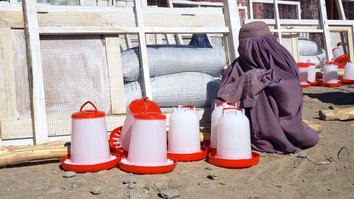HERAT -- Iranian nationals are smuggling poultry products across the border into Afghanistan in an effort to dump inferior chicken meat and eggs and destroy Afghanistan's newly developed poultry industry, say officials and farmers in Herat Province.
The Afghan government on February 6 declared imports of chicken and eggs from Iran illegal because of an avian influenza outbreak in Iran.
"Organised groups in Iran push illegal imports of chicken and eggs into Afghanistan, and they intentionally target the poultry industry in Herat Province," said Ziaulhaq Rahmani, director of the Herat Poultry Farmers Association.
He did not elaborate on who smuggles chicken and eggs to Afghanistan, but said if the illegal imports of chicken and eggs from Iran continue, poultry farms in Afghanistan will go bankrupt.
![A farmer feeds chickens in Injil District, Herat Province, on June 18. [Omar]](/cnmi_st/images/2019/07/03/18751-m_6-585_329.jpg)
A farmer feeds chickens in Injil District, Herat Province, on June 18. [Omar]
![A number of poultry farmers gather June 15 at the Herat Poultry Farmers Association in Herat city to discuss the illegal import of chicken and eggs from Iran. [Omar]](/cnmi_st/images/2019/07/03/18752-m_10-585_329.jpg)
A number of poultry farmers gather June 15 at the Herat Poultry Farmers Association in Herat city to discuss the illegal import of chicken and eggs from Iran. [Omar]
"Illegal imports of chicken and eggs from Iran have damaged our domestic products," he said. "Iran uses a dumping strategy ... and it has always inflicted losses on our domestic products."
More than 1.5 million eggs and almost 100 tonnes of chicken are produced in Herat Province daily, according to Rahmani.
The locally produced products are of higher quality, he said, while chicken and eggs imported from Iran are substandard.
Millions of dollars in losses
Herat's poultry industry suffered as much as $25 million (2 billion AFN) in losses last year due to the avian influenza that originated in Iran and is continuing to suffer from illegal Iranian imports.
"We have invested heavily in poultry farms," said Jalil Ahmad Azeemi, a poultry farm owner in Herat Province. "Last year we saw many losses from avian influenza, and this year illegal imports of chicken and eggs caused us big losses."
"Last year, we saw $20-25 million [1.6 to 2 billion AFN] in losses from avian influenza that came from Iran, and now, for the second time, it is trying to annihilate the poultry farms altogether in Herat," he said.
"As the United States and some other countries have placed sanctions on Iran, the country tries to use every possibility to secure its economic interests," said Sayed Farid Hussaini, another poultry farm owner in Herat. "Therefore, Iran wants to gain ground in the Afghan markets and destroy our domestic production."
"Imports of chicken and table eggs from Iran have negatively affected our business," he said. "The Afghan government must put efforts into saving our poultry industry."
The quality of Iranian chicken and eggs is also questionable, farmers say.
"Chicken and eggs that are illegally imported from Iran are expired by one to two months and have lost their quality," said Muhammad Bahadur, a poultry farm owner in Herat Province.
Damage to domestic production
The Iranian regime has a history of trying to undermine Afghan industry and business success, according to authorities in Herat Province.
"Herat has achieved self-sufficiency in producing chicken and table eggs thanks to huge investments in the sector, but illegal imports of chicken and eggs have made both investors and the Department of Agriculture worried," said Abdul Saboor Rahmani, director of the Department of Agriculture in Herat.
"Whenever an industry starts to grow in Herat, it has been hurt through illegal and destructive competition," he said.
Iran has faced sanctions that prohibit engaging in trade with other neighbouring countries, leaving Afghanistan as the lone market for its products, Rahmani said.
"One of our concerns is avian influenza in Iran," he said. "According to the law, no poultry imports are allowed to enter Afghanistan and based on the decision of the Ministry of Agriculture, all Iranian poultry products from Iran are banned."
"Last year, more than 44 poultry farms that housed more than 600,000 egg-laying hens were annihilated because of avian influenza, and most of these farms weren't able to return to business," Rahmani said. "Our investors lost millions of dollars."
Efforts to curb illegal imports
Almost 3,000 poultry farms operate in Herat -- most in districts and rural areas -- and their number continues to grow. They supply chicken and egg products locally and also to Ghor, Badghis, Farah, Nimroz and Helmand provinces.
After Herat poultry farmers lodged multiple complaints about the illegal imports of chicken and eggs from Iran, border forces have elevated security measures.
As a result, a number of vehicles loaded with chicken and eggs from Iran have been confiscated in the past month, according to Herat authorities.
"We have received reports that Iranian goods are illegally imported," said Jilani Farhad, spokesman for the Herat governor. "We have instructed all the customs officers to curb illegal imports because supporting domestic products and local industry is our priority."
"We are self-sufficient in producing chicken and eggs, and we have placed strict restrictions on their illegal imports," he said. "We are ready to first satisfy the need of domestic markets and to export the excess chicken and eggs."
Those who illegally import chicken and eggs from Iran will face prosecution and punishment, he said.







